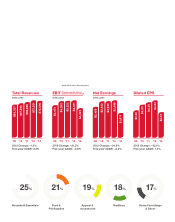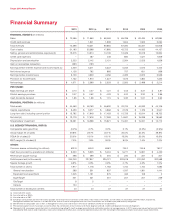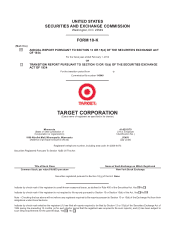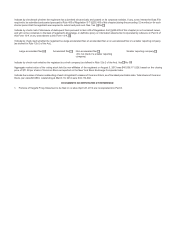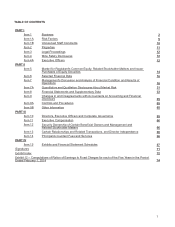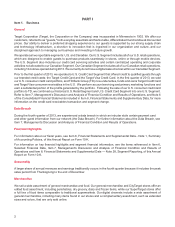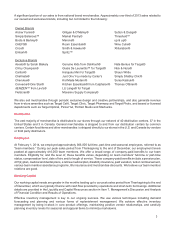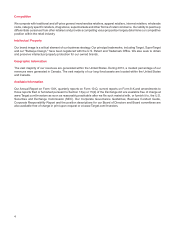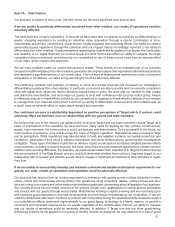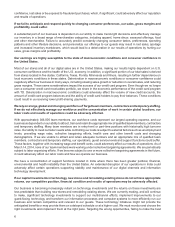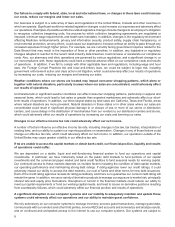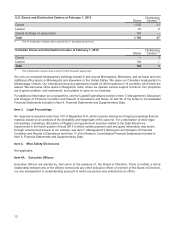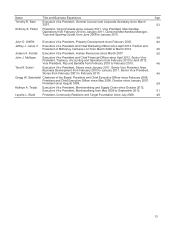Target 2013 Annual Report Download - page 11
Download and view the complete annual report
Please find page 11 of the 2013 Target annual report below. You can navigate through the pages in the report by either clicking on the pages listed below, or by using the keyword search tool below to find specific information within the annual report.6
confidence, lost sales or be exposed to fraudulent purchases, which, if significant, could adversely affect our reputation
and results of operations.
If we fail to anticipate and respond quickly to changing consumer preferences, our sales, gross margins and
profitability could suffer.
A substantial part of our business is dependent on our ability to make trend-right
our inventory in a broad range of merchandise categories, including apparel, home décor, seasonal offerings, food
and other merchandise. Failure to accurately predict constantly changing consumer tastes, preferences, spending
patterns and other lifestyle decisions, and personalize our offerings to our guests may result in lost sales, spoilage
and increased inventory markdowns, which would lead to a deterioration in our results of operations by hurting our
sales, gross margins and profitability.
Our earnings are highly susceptible to the state of macroeconomic conditions and consumer confidence in
the United States.
Most of our stores and all of our digital sales are in the United States, making our results highly dependent on U.S.
consumer confidence and the health of the U.S. economy. In addition, a significant portion of our total sales is derived
from stores located in five states: California, Texas, Florida, Minnesota and Illinois, resulting in further dependence on
local economic conditions in these states. Deterioration in macroeconomic conditions or consumer confidence could
negatively affect our business in many ways, including slowing sales growth or reduction in overall sales, and reducing
gross margins. These same considerations impact the success of our credit card program. Even though we no longer
own a consumer credit card receivables portfolio, we share in the economic performance of the credit card program
with TD. Deterioration in macroeconomic conditions could adversely affect the volume of new credit accounts, the
amount of credit card program balances and the ability of credit card holders to pay their balances. These conditions
could result in us receiving lower profit-sharing payments.
We rely on a large, global and changing workforce of Target team members, contractors and temporary staffing.
If we do not effectively manage our workforce and the concentration of work in certain global locations, our
labor costs and results of operations could be adversely affected.
With approximately 366,000 team members, our workforce costs represent our largest operating expense, and our
business is dependent on our ability to attract, train and retain the appropriate mix of qualified team members, contractors
and temporary staffing. Many team members are in entry-level or part-time positions with historically high turnover
rates. Our ability to meet our labor needs while controlling our costs is subject to external factors such as unemployment
levels, prevailing wage rates, collective bargaining efforts, health care and other benefit costs and changing
demographics. If we are unable to attract and retain adequate numbers and an appropriate mix of qualified team
members, contractors and temporary staffing, our operations, guest service levels and support functions could suffer.
Those factors, together with increasing wage and benefit costs, could adversely affect our results of operations. As of
March 14, 2014, none of our team members were working under collective bargaining agreements. We are periodically
subject to labor organizing efforts. If we become subject to one or more collective bargaining agreements in the future,
it could adversely affect our labor costs and how we operate our business.
We have a concentration of support functions located in India where there has been greater political, financial,
environmental and health instability than the United States. An extended disruption of our operations in India could
adversely affect certain operations supporting stability and maintenance of our digital channels and information
technology development.
If our capital investments in technology, new stores and remodeling existing stores do not achieve appropriate
returns, our competitive position, financial condition and results of operations may be adversely affected.
Our business is becoming increasingly reliant on technology investments and the returns on these investments are
less predictable than building new stores and remodeling existing stores. We are currently making, and will continue
to make, significant technology investments to support our multichannel efforts, implement improvements to our
technology and transform our information processes and computer systems to more efficiently run our
business and remain competitive and relevant to our guests. These technology initiatives might not provide the
anticipated benefits or may provide them on a delayed schedule or at a higher cost. We must monitor and choose the
right investments and implement them at the right pace. Targeting the wrong opportunities, failing to make the best
decisions and effectively manage
guest-facing


